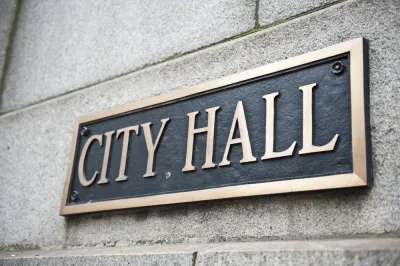City management models offer different benefits and drawbacks.

Alan Ehrenhalt, writing in Governing, describes the history of a little-known form of municipal government known as city commission government. Portland, Oregon, the only American city to use this management system, will now replace it with a “more conventional structure,” writes Ehrenhalt, using this as a jumping-off point for discussing the merits and drawbacks of different city management models.
Although city commissions are intended to “invest politicians with executive authority so that they would take government more seriously and to encourage voters to elect more capable candidates in the first place,” the problems with the model are easy to spot. “[The model gives] elected council members the authority to function as administrators of key city departments. You could win a place on the council and soon find yourself running the police department, even if (as was often the case) you didn’t know much about law enforcement.”
Nevertheless, the system paved the way for the city manager model common in many small cities and towns today. This system comes with its own flaws, such as how “city-manager government leaves no one in a position to serve as a public spokesperson and chief decision-maker.” Meanwhile, the strong-mayor system can lead to either success or corruption, depending on the people in office. As Ehrenhalt concludes, “A dedicated and shrewd public servant can make any system work — even a city commission — while a scoundrel or an incompetent can make any system fail.”
FULL STORY: Is There a Single Best Way to Manage a City?

National Parks Layoffs Will Cause Communities to Lose Billions
Thousands of essential park workers were laid off this week, just before the busy spring break season.

Retro-silient?: America’s First “Eco-burb,” The Woodlands Turns 50
A master-planned community north of Houston offers lessons on green infrastructure and resilient design, but falls short of its founder’s lofty affordability and walkability goals.

Delivering for America Plan Will Downgrade Mail Service in at Least 49.5 Percent of Zip Codes
Republican and Democrat lawmakers criticize the plan for its disproportionate negative impact on rural communities.

Test News Post 1
This is a summary

Test News Headline 46
Test for the image on the front page.

Balancing Bombs and Butterflies: How the National Guard Protects a Rare Species
The National Guard at Fort Indiantown Gap uses GIS technology and land management strategies to balance military training with conservation efforts, ensuring the survival of the rare eastern regal fritillary butterfly.
Urban Design for Planners 1: Software Tools
This six-course series explores essential urban design concepts using open source software and equips planners with the tools they need to participate fully in the urban design process.
Planning for Universal Design
Learn the tools for implementing Universal Design in planning regulations.
EMC Planning Group, Inc.
Planetizen
Planetizen
Mpact (formerly Rail~Volution)
Great Falls Development Authority, Inc.
HUDs Office of Policy Development and Research
NYU Wagner Graduate School of Public Service





























